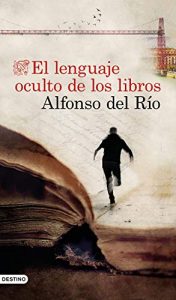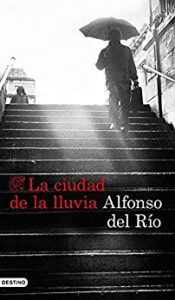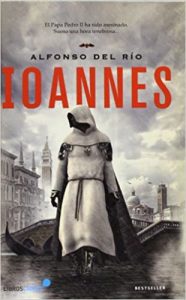A good writer of mystery With a vocation for thrillers, it must be able to transfer that notion of verisimilitude on as much strange component as it surrounds us. Because, as much as we have a supposed efficient and empirical answer for each need, what ends up happening does not always depend on controllable variants.
Deep down, each person is an unfathomable mystery, and literary proposals such as those of Alfonso del Rio They bring us closer to the enigmatic space where drives and soul coexist, engines that govern us from our depths. Everything that comes after rewrites the events from fascinating intrahistories capable of providing a new vision of any era.
With his first novels, Alfonso already moves with ease in presenting the trompe-l'oeil and lattices of his characters so that we get carried away by appearances to end up transforming the reality of what is narrated from the most unexpected turn. We adorn that essential part of the protagonists with scenery between yesterday and today, with that game of flashbacks that would be signed by him himself. Joel dicker. And we end up enjoying very entertaining novels.
Top 3 recommended novels by Alfonso del Río
The hidden language of books
I remember Ruiz Zafon. It happens to me whenever I discover a novel that points to the esoteric aspect of books, to hidden languages, to that aroma of wisdom collected on endless shelves, perhaps in new cemeteries of books...
And it's okay, so be it. The vast imagination of the Catalan writer is what he has ... But this time it is up to a Alfonso del Rio that again takes as the epicenter of its mysteries a Bilbao made to measure like Ruiz Zafón's Barcelona.
From the capital of Biscay to different European scenarios, also alternating different times. This is how a suggestive mystery is woven that takes us and brings us fooled like the trick of a good conjurer.
Bilbao and Oxford, 1933. Gabriel de la Sota, writer and professor at the University of Oxford, is the heir to one of the greatest fortunes of Biscay, owner of a large steel company. But someone dark has discovered a dark secret from his past and is willing to do anything to sink it. CS Lewis and JRR Tolkien, your best friends, will be with you unconditionally so that you can create the best story ever written.
London, 1961. Mark Wallace, father of a ten-year-old girl who has a very special gift, is a renowned British lawyer about to retire. One day he receives a visit from the writer Úrsula de la Sota, who instructs him to investigate his family past and heritage: the international press has echoed that Gabriel de la Sota's fortune may not have been completely lost in 1933 and that the keys to knowing where he is can be found in his latest novel.
A story that travels between Oxford and Bilbao over more than thirty years and in which all the characters are connected by a mystery that was buried. And only those who manage to decipher the hidden language behind the pages of the greatest work of the famous writer will be able to reveal it. A story about good and evil, about the love of truth and literature, about the strength of authentic friendship, which always accompanies and does not judge.
The city of rain
Bilbao as a rainy city is a typical image that can have its days numbered thanks to climate change. But the imaginary already has this great city cataloged in this way, so the synecdoche or metaphor of "city of rain" still works perfectly.
But back in the 80s it was something else and the idea of the rain city was limited to the reality of the capital of Biscay as a very recognizable gray city. In that city assaulted by rain, day in and day out we also find Alain Lara, a budding footballer who is beginning to emerge in Athletic. But it's not about football... Because Alain's life begins to collapse when he discovers an unknown and enigmatic photograph of his grandfather from the XNUMXs.
Intuition that a relative is not or has not been what he always seemed to be always arouses an unavoidable curiosity. If we add to this the indications of a past hidden at all costs, we can guess that Alain will be fully involved in the satisfaction of his curiosity as the sustenance and foundation of what he himself is.
The lives of our ancestors somehow draw the line of our destinies. And Alain, with the natural human desire to know him, throws himself into the dark well that can be seen under that photograph.
Rodrigo, the grandfather, appears accompanied by a pubescent Ignacio Aberasturi, who eventually rose to the highest echelons of banking. And yet, something or someone ended up completely erasing him from the social scene, along with his grandfather. So that photo takes on special relevance as soon as the coincidence of the characters who ultimately disappeared is revealed.
Alain will try to pull the thread, turning to the young María Aberasturi. Between them they manage to trace an interesting line of investigation that leads them to Nazi Germany. Tracing it, there is no doubt that the lives of Rodrigo and Ignacio reached Berlin, like a train from the past full of doubts and dark omens. Those times of war that were about to transform the world into a monstrous planet seem even further away for two young people like Alain and María.
Therefore, everything they can discover will shake them inside, to the point where every secret is better understood in this way, essentially secret, imperatively hidden from everyone, especially for relatives who can get to know the true identity of their family tree.
joannes
Starting a literary career with a historical novel of this magnitude already augurs, at the very least, daring. In his literary debut, Alfonso del Río demonstrated that budding writer with the makings of a good storyteller. And despite certain shortcomings in the characterization of its protagonists, the story inevitably leads you to that other previous world with the power of good plots...
Year 425 after Christ. Attila approaches Rome. Pope Leo knows that if "the scourge of God" does not conquer her, it will be someone else who will sooner or later. So he entrusts Ioannes, a knight who seems to be blessed with immortality, to remove a mysterious chest from the city and flee to a nation that is emerging at that moment, called to become the powerful Serene Republic of Venice. Carnival of Venice, in our days. Pope Peter II is thrown from the Campanile by a hooded man.
The city is besieged until the crime is solved, and traps in its network of channels the son of an English millionaire, a young Spanish archaeologist and a whole panoply of characters who do not know to what extent the history in which they participate can change the world. Ioannes is a dizzying novel. The intrigue reaches up to the dome of the Church and plunges into the tunnel of time. Political and spiritual interests conflict in a Venice portrayed by Alfonso del Río with historical precision and legendary features. In the battle between relentless conspirators and men and women ready for the victory of good, the reader will only find respite at the end.



